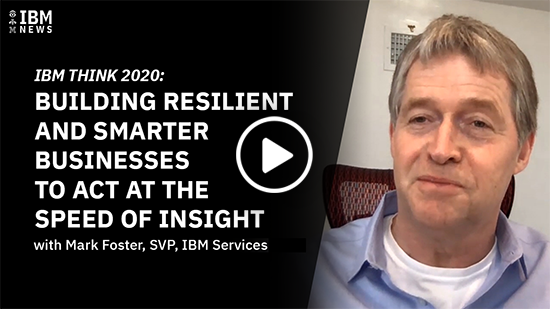THINK 2020 stories
Mark Foster: Businesses Adjust, to Emerge Smarter and Stronger
By Matt Hunter
May 6, 2020

Watch highlights from Mark Foster's keynote at Think Digital
The COVID-19 pandemic is an inflection point for organizations around the world.
Many are looking to build on the successful use of digital technologies to address disruptions caused by the health crisis and accelerate digital transformations that were already underway, Mark Foster, Senior Vice President of IBM Services and Global Business Services, said Wednesday at the Think Digital virtual conference.
→ Watch a replay of Mark Foster's complete Think Digital keynote
As much as the crisis is testing their resiliency, some companies are taking steps to turn the disruption to their advantage. “There’s an element of optimism emerging around how we could maybe emerge stronger from this current crisis,” Foster said, “and how we could build truly smarter businesses that will be better able to compete in the long term.”
The value has become even more apparent during the crisis in the adoption of technologies like artificial intelligence, blockchain, cloud, 5G and IoT. Those technologies help organizations build new market-making platforms, create intelligent workflows and change long-standing cultural habits, Foster said during his keynote presentation.
He cited organizations that have successfully adopted digital practices in response to the pandemic. Among them: a hospital chain that is using AI to help hire more than 4,000 nurses per month while working virtually, and a French bank that used the Watson Assistant virtual agent to transform customer experiences and now is applying the technology to answer questions about the impact of COVID-19.
Foster also pointed to the use of IBM’s Watson Assistant for Citizens by the Polish Ministry of Health and a growing number of other organizations to establish digital assistant helplines for queries related to the health crisis.
Executives from three IBM client companies—Yara, Shell and Frito-Lay—joined Foster to discuss how they are using technology and intelligent workflows to transform their businesses.
Yara Supports Sustainability
Svein Tore Holsether, President and CEO of Yara, a global leader in crop nutrition, described how the company is building a digital platform to incentivize farmers to move toward sustainable agricultural practices.
Digital technologies can help consumers understand how all the inputs into a supply chain will factor into the price of the end product. “Through a digital platform, we can create that traceability and visibility,” Holsether said.
Yara agronomists work with a million farmers each year, Holsether said. As in-person meetings have become more limited, digital engagement has increased.
“We’re really proud to work together with IBM to create that platform,” he said, “in order to support the farmers, and to respond to the demands of the end consumers to behave and buy in a more responsible way.”
Shell Drives Digitization
Carol Chen, VP of Global Lubricants Marketing at Shell, described a new platform for the mining industry that the company is working with IBM to create.
Shell recognized that mining companies suffer common pain points in their operations, Chen said. So the company is building a platform, called Oren, to help miners accelerate the adoption of digital solutions in their workflows. The goal is to help mining operations become more data-driven, automated, safe and efficient, Chen said.
“Our vision for Oren is to be the go-to place for mining and many of the industrial sectors to truly drive digital transformation at scale,” she said.
Frito-Lay Responds Rapidly
Frito-Lay, the world’s largest snack company, is working with IBM to transform how it does business.
Frito-Lay and IBM set up a system that empowers employees at one end of the distribution chain—that closest to customers—to provide input back to headquarters. That has enabled the company to more rapidly respond to changing preferences, said Michael Lindsey, Senior Vice President and Chief Transformation Strategy Officer of Frito-Lay North America.
“It’s a very, very different way of working,” Lindsay said. “It required a fundamental cultural shift from working from the top down.’’
As wrenching as the coronavirus pandemic has proven to be in so many ways, organizations around the world now see an opportunity to accelerate their change process, Foster said.
“We also have an opportunity now,” he said, “to move ahead and to shape the future of the cognitive enterprise, the future of smarter business.”